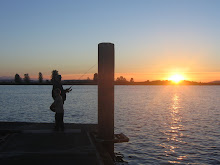
Weight: 188.2
I didn't make it the full 30 days. I timed things wrong. I went 30 days without paying for food, but toward the end there were lots of food opportunities surrounding a board of directors visit, and I couldn't afford to pass up things like shrimp quesadillas, Chinese buffet, and crab dip. Despite this, I did lose twenty pounds and learned a lot about the edible plants, seafood, and fungi in my region. Sorry to those of you waiting for a heroic effort, but such is the reality. Given the dire economy these days, the experiment was quite valuable, and in addition to self-reflection, I have some observations related to sustaining oneself. I will end my experiment with a list of lessons learned (in no particular order).
1. Oysters fresh from a clean bay are better tasting than anything you can get at a restaurant.
2. All the excitement about edible leafy greens in the edible plant books masks the reality that even if you identify and harvest these, you really need other sources of protein to sustain yourself. The most protein I could find was through the plentiful Amaranth, but it still seemed inadequate without constant pier fishing.
3. I need to try this again during salmon season, but plan in such a way that I can actually stand a chance of catching my limit once or twice with some big fish. The constant fishing for perch was convenient but time consuming.
4. There are lots of immigrant families in affluent suburbia that fish not for the sexiness of the sport but for food. It was great to become friends with my Russian neighbors in particular, despite the language barrier with the adults (the kids chatted with my sons freely).
5. Pollution, whatever your politics, matters for those who want a direct connection to the food of the land. I don't think it would have been healthy for me to accumulate mercury by living off of Puget Sound fish exclusively.
6. King kelp is abundant and edible but tastes bad.
7. Gardens of the size most families tend cannot sustain more than one adult on their own.
8. One needs to consider purchasing whole wheat, and a grinding device, to have flour. Bread became my savior over the month, though I only went through half my bag of flour and half my bag of sugar.
9. If you aren't lucky enough to live where blackberries grow literally everywhere, it is hard to try what I tried. Sorry Arizona friends.
10. Dandelions are everywhere and, when not full of herbicide, are great to eat and especially to stir fry.
11. Nasturtiums are my favorite flower--to eat.
12. One can be a hunter-gatherer only if one does not have a full-time job. Civilization rests on the agricultural practices progressives despise.
13. Killing a chicken loses doesn't seem too hard to do emotionally when you are terribly hungry. I could have wrung a neck had it not been for Mukilteo's prohibition of chickens. (I remember some of my folks' hippie friends realized their regretfully carnivorous desires in a communal setting). Seattle residents can own three hens, and get their eggs. That would be the key to success in this experiment.
14. We do a lot more "numero dos" when we consume lots of processed foods. I never had the gastro-intestinal problems and gassiness I expected. I think, overall, my diet was much healthier than what I had eaten in the August.
15. Making hard cider is pretty easy.
16. Cooperative life is great. Having friends with fruit trees was a saving grace through my silly endeavor.
17. Even if I have to go to the store now, I will supplement my diet with the "free" food around me for the rest of my life.
18. Mushroom hunting is not as dangerous as I thought. You just need careful identification, perhaps a local mycological club to help you identify tough species, and a dedication to eating only species that have few or no poisonous look-alikes.
19. Kids appreciate even strange tasting foods when they have a role in finding and harvesting them. I could never have gotten my kids to eat so much fish and weeds had it not been "fun."
20. Having to hike for food negates even successful forays in terms of net caloric gain.
21. If you try this, be careful to identify things with good tools, don't be reckless, and consider having cultivated potatoes and you will be able to do a better job than I did.
God's peace all. Check back next August and I may try this anew, with better planning, but stricter rules (like no sugar/flour).

3 comments:
Mallinson, your blog has, by far, been the most interesting that I've read. You have to find a new reason to keep one current.
Agreed. I enjoyed following this all month. I'm not so much sad that you didn't make it the full 30 days, rather, I'm sad that your blog is coming to an end.
Part of this experiment intrigued me, however. I am currently your typical American, consuming much in the way of processed food and producing much in the way of the 'numero dos' you speak about. I enjoyed my times in Asia years ago because the food was simpler, fresher, and generally more satisfying. It's one of the many reasons I want to go back.
I don't believe I'll be able to follow in your footsteps anytime soon (east Texas seems to be a horrible location for foraging, and I'll be moving to the LA area in a couple of months for work, Lord willing), but it is good to know that we don't have to be completely bound to only what we can find in supermarkets / overpriced health food stores.
I'll regroup and do this again. Perhaps on something more crazy and full of more interesting human interactions. Thanks for the notes.
Post a Comment